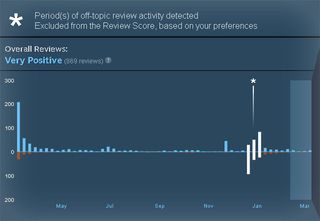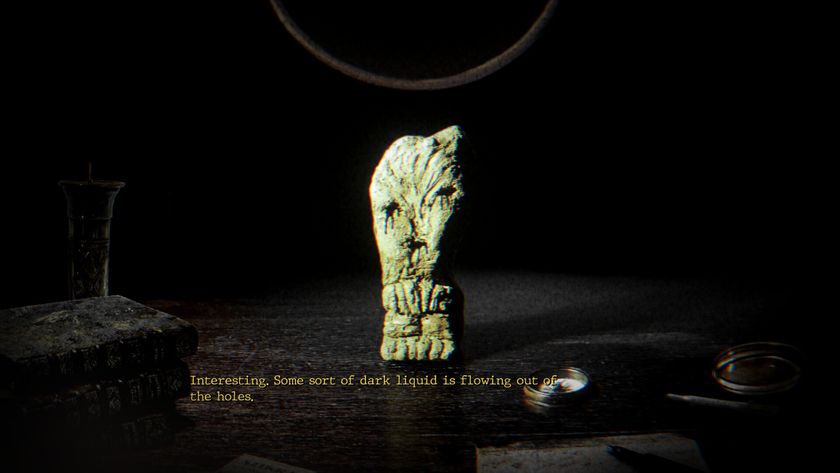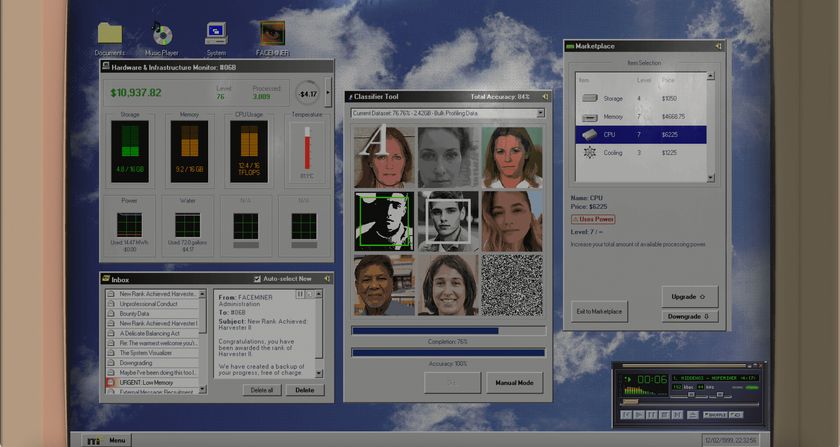Valve takes steps against Steam review bombs
User reviews have been changed to exclude 'off-topic' reviews from overall scores.

A 'review bomb' is a sudden influx of a large number of negative user reviews of a game, usually regardless of its actual quality, intended to discredit or punish its developer or publisher. Metro 2033 and Last Light are recent high-profile examples: Steam users who were unhappy with Deep Silver's decision to make Metro Exodus an Epic Store exclusive dropped thousands of negative reviews on its predecessors, enough to negatively impact their overall user ratings.
It's an inherent flaw in user review systems—although some see it as a feature—that can set game makers against their audiences: "Players value reviews highly, and want us to ensure they're accurate and trustworthy," as Valve said in a new Steam blog post. "Developers understand that they're valuable to players, but want to feel like they're being treated fairly."
After collecting feedback and analyzing data, as it does, Valve has announced plans to tackle the problem by identifying review bombings, and excluding them from overall review scores. The process for doing so will begin with a new, automated tool that will identify "anomalous review activity" on all Steam games, in as close to real-time as possible. When a problem is detected, a team at Valve will be notified, and will investigate further.
"Once our team has identified that the anomalous activity is an off-topic review bomb, we'll mark the time period it encompasses and notify the developer," Valve wrote. "The reviews within that time period will then be removed from the Review Score calculation."
Off-topic content will include obvious things such as storefront changes and exclusive publishing deals, and also complaints that are related to, but not actually about, games, including the presence of DRM and changes to EULAs. Valve said the "general" Steam user doesn't really care about that sort of thing and so for most users, review scores are more accurate if those complaints are excluded—and users who do get into it at that level are often more willing to "dig a little deeper" before making their purchases.
The reviews themselves will remain in place, allowing those who want to dig deeper to do so, but the store page will be marked to indicate that off-topic review activity was detected and removed from the score. The review graph will also indicate which segment of offending reviews has been removed from the score.

If, for some reason, you want review bombs included in overall review scores, that will be an option: In the "Store Content Preferences" of your account settings (not the Steam settings, in case your having trouble finding it—it's the drop-down menu near the top-right of the Steam page, under your username) you can opt to include or exclude off-topic review activity from review scores. To be clear, this will only impact what you see: You cannot influence whether off-topic reviews are included in review scores for other people.
The biggest gaming news, reviews and hardware deals
Keep up to date with the most important stories and the best deals, as picked by the PC Gamer team.
One flaw in the system is that any legitimate reviews falling within the excluded review-bombing period will also be omitted: "We've tested our process of identifying off-topic review bombs on the entire history of reviews on Steam, and in doing so, we've found that while we can look through reviews and community discussions to determine what's behind the review bomb, it isn't feasible for us to read every single review," Valve explained. But review bombs "tend to be temporary distortions," it added, so the impact on the overall review score will be negligible, and the reviews themselves will still be up to read.
Other new user review features are coming, but Valve said it felt that this one was important enough to roll out on its own. It's not clear whether the updated review system is actually in place yet, however: The blog post indicates that it is, but there's nothing about off-topic or excluded review content on either the Metro 2033 or Metro: Last Light store pages. It's possible the update isn't fully rolled out yet, although the new option to exclude off-content reviews from review scores is present; I've emailed Valve to clarify and will update if I receive a reply.
Update: Valve has added a Q&A section to its blog post to address some questions about the changes to the review system. It emphasized that it is not deleting reviews, but only changing the way it calculates review scores, and said that it has decided "not to unilaterally grandfather in what's happened in the past," which is presumably why the Metro reviews remain untouched despite clearly being review bombs.
It also committed to ensuring that users can continue to use the review system as they see fit, including "to react to deception or discovering something they've been sold is sub-par."
"We remain in active conversation with you, the community, about what you want from reviews along with the various partners who sell their games on Steam. Reviews are an important part of Steam, which is why we continue to do the work to make sure that they are not being manipulated by anyone, " the Q&A concludes. "It's the same reason that we decisively ban partners who engage in review manipulation—customers need to be able to trust the system for it be valuable."

Andy has been gaming on PCs from the very beginning, starting as a youngster with text adventures and primitive action games on a cassette-based TRS80. From there he graduated to the glory days of Sierra Online adventures and Microprose sims, ran a local BBS, learned how to build PCs, and developed a longstanding love of RPGs, immersive sims, and shooters. He began writing videogame news in 2007 for The Escapist and somehow managed to avoid getting fired until 2014, when he joined the storied ranks of PC Gamer. He covers all aspects of the industry, from new game announcements and patch notes to legal disputes, Twitch beefs, esports, and Henry Cavill. Lots of Henry Cavill.















